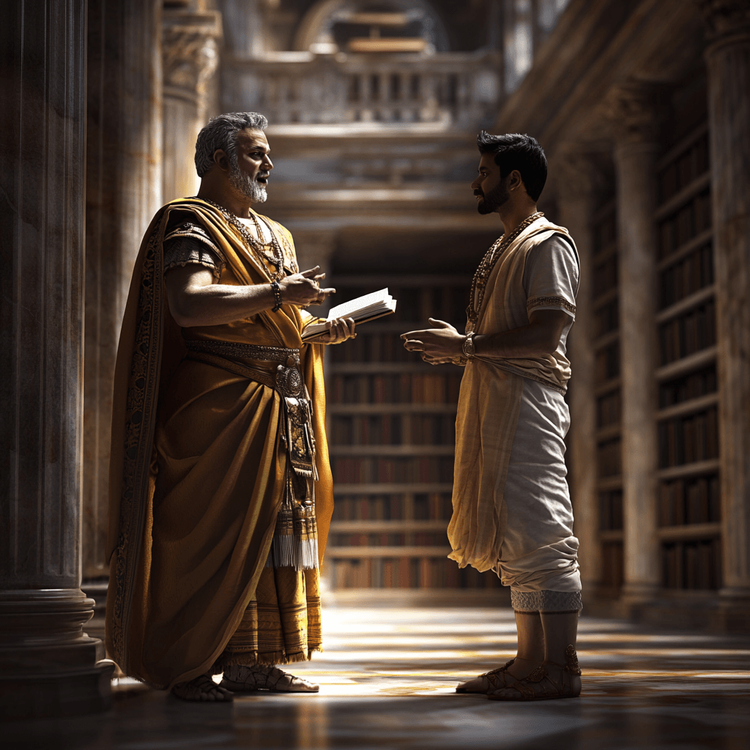Life and Achievements of Augustus – Rome’s Greatest Emperor
Last Updated At: 17 Jul 2025
13 min read

When people think about powerful leaders who shaped the world, Augustus often comes to mind as one of the most influential figures in human history. As the first Roman Emperor, Augustus transformed a crumbling republic into the mighty Roman Empire that would dominate the Mediterranean world for centuries. His story is one of political genius, military strategy, and incredible ambition that changed the course of Western civilization.
Who Was Augustus
Augustus, originally named Gaius Octavius Thurinus, was born on September 23, 63 BCE, in Rome. He later became known as Octavian before finally taking the name Augustus when he became emperor. Most people don't realize that Augustus wasn't born into the highest levels of Roman society, but his life took a dramatic turn when his great-uncle Julius Caesar adopted him as his heir.
The name "Augustus" itself means "revered" or "sacred" in Latin, and it was a title specifically created for him by the Roman Senate in 27 BCE. This marked the beginning of his official reign as the first Roman Emperor, though he had been effectively ruling Rome for several years before that.
Augustus lived for 75 years, which was quite remarkable for ancient times. During his 45-year reign, he transformed Rome from a war-torn republic into a stable, prosperous empire. His influence extended far beyond his lifetime, creating systems and traditions that would last for hundreds of years.
Early Life and Rise to Power
The young Augustus grew up during one of the most turbulent periods in Roman history. The Roman Republic was falling apart, with powerful generals fighting each other for control. Civil wars were tearing the empire apart, and many Romans feared their civilization might collapse entirely.
Everything changed for Augustus when Julius Caesar was assassinated in 44 BCE. At just 18 years old, Augustus learned that Caesar had named him as his primary heir and adopted son. This wasn't just about inheriting money – it meant Augustus had a claim to Caesar's political legacy and the loyalty of his soldiers.
Initially, Augustus worked with Mark Antony and Marcus Lepidus to form the Second Triumvirate, a three-way alliance to rule Rome together. They hunted down Caesar's assassins and divided the Roman territories among themselves. However, this partnership wouldn't last long.
The relationship between Augustus and Mark Antony became increasingly strained. Mark Antony had allied with Cleopatra, the famous Egyptian queen, and was spending more time in Egypt than in Rome. Many Romans saw this as a betrayal of Roman values and traditions.
The conflict came to a head at the Battle of Actium in 31 BCE. Augustus's forces defeated Mark Antony and Cleopatra's combined fleet in this decisive naval battle. Following their defeat, both Mark Antony and Cleopatra committed suicide, leaving Augustus as the sole ruler of the Roman world.

The Transformation from Republic to Empire
One of the most remarkable things about Augustus was how carefully he managed his rise to absolute power. Unlike his great-uncle Julius Caesar, who had been too obvious about his ambitions and was murdered for it, Augustus was much more subtle and politically savvy.
Augustus understood that Romans still cherished their republican traditions, even though the republic had been failing for decades. Instead of declaring himself dictator or king, he claimed to be "restoring" the republic. He called himself "Princeps," meaning "first citizen," rather than emperor.
In reality, Augustus kept all the real power for himself while maintaining the appearance of republican government. The Senate still met, consuls were still elected, and traditional ceremonies continued. However, Augustus controlled the military, made all important decisions, and had the final say on everything that mattered.
This brilliant political strategy allowed Augustus to create a new form of government - the Roman Empire – without triggering the kind of resistance that had led to Caesar's assassination. He essentially fooled people into accepting imperial rule by making it look like the old system was still in place.
The transformation was so successful that it became the template for how Roman emperors would rule for the next several centuries. Augustus had solved the fundamental problem of how to govern a vast, diverse empire effectively.
Augustus's Major Achievements
The reign of Augustus was marked by numerous groundbreaking achievements that had lasting impacts on Rome and the world. Perhaps his greatest accomplishment was bringing peace and stability to the Roman world after decades of civil war.
The "Pax Romana" or Roman Peace began under Augustus and lasted for about 200 years. During this period, there were no major civil wars within the empire, trade flourished, and Roman culture spread throughout the Mediterranean world. This peace allowed for unprecedented economic growth and cultural development.
Augustus also completely reorganized the Roman military. He created the Praetorian Guard, an elite unit responsible for protecting the emperor, and established permanent legions stationed on the empire's frontiers. He also created a professional navy and improved the training and equipment of Roman soldiers.
Under Augustus, Rome underwent massive building projects. He famously boasted that he "found Rome a city of bricks and left it a city of marble." New forums, temples, theaters, and public buildings were constructed throughout the empire. The city of Rome itself was transformed into a magnificent capital worthy of a world empire.
Augustus also established efficient administrative systems that helped govern the vast empire. He created a professional civil service, standardized weights and measures, and improved the tax collection system. These reforms made the empire more efficient and profitable.
Want to help your child write like a Roman historian? PlanetSpark’s Creative Writing Course empowers young minds to explore history, imagination, and expression through structured, expert-led sessions. Check it out here!
The Golden Age of Rome
The period under Augustus is often called the "Golden Age" of Roman literature and arts. Augustus was a great patron of the arts and actively encouraged writers, poets, and artists to create works that celebrated Roman culture and values.
Some of the greatest works of Latin literature were produced during this time. Virgil wrote the "Aeneid," an epic poem that became Rome's national epic. Horace created beautiful lyric poetry, while Ovid wrote his famous "Metamorphoses." These works are still read and studied today, nearly 2,000 years later.
Augustus understood that culture and propaganda went hand in hand. He supported artists and writers who created works that promoted Roman values and his achievements. This wasn't just about ego – it was a sophisticated strategy to create a shared Roman identity throughout the diverse empire.
The emperor also promoted traditional Roman religious practices and moral values. He rebuilt numerous temples and revived old religious festivals. Augustus wanted to create a sense that Rome was returning to its traditional values after the chaos of the civil war period.
This cultural renaissance extended throughout the empire. Roman architecture, art, and literature spread to provinces in Gaul, Spain, Britain, and North Africa. The influence of Augustan culture can still be seen in European art and literature today.

Military Conquests and Expansion
While Augustus is often remembered for bringing peace, he was also a skilled military strategist who significantly expanded the Roman Empire. Under his rule, Roman legions conquered new territories and pushed the empire's boundaries to their furthest extent.
Augustus completed the conquest of Spain, a process that had taken Rome nearly 200 years. He also conquered the Alpine regions, securing Rome's northern borders. In the east, he negotiated a peaceful settlement with the Parthian Empire, recovering Roman military standards that had been lost in earlier battles.
Perhaps most importantly, Augustus pushed Rome's frontier to the Rhine and Danube rivers, creating strong defensive boundaries. He established new provinces in the Balkans and Germany, though a major defeat in the Teutoburg Forest in 9 CE convinced him to abandon further expansion into Germany.
The emperor also conquered Egypt, which became one of Rome's most valuable provinces. Egypt's grain shipments helped feed the growing population of Rome, while its wealth funded many of Augustus's building projects and military campaigns.
Augustus was careful to balance expansion with consolidation. He understood that conquering territory was only the first step – the real challenge was incorporating new peoples into the Roman system and defending the expanded borders.
Social and Economic Reforms
Beyond military and political achievements, Augustus implemented comprehensive social and economic reforms that improved life for millions of people throughout the empire. His policies touched every aspect of Roman society.
Augustus passed laws encouraging marriage and childbirth among the upper classes, as he was concerned about declining birth rates among Roman citizens. He offered tax benefits to families with multiple children and penalties for those who remained unmarried. While these laws were controversial, they reflected his concern about maintaining Roman population levels.
The emperor also reformed the legal system, creating more consistent laws throughout the empire. He established permanent courts and professional judges, making the legal system fairer and efficient. Many of these legal principles eventually influenced modern legal systems.
Augustus created the world's first police force and fire department in Rome. The city had grown enormous, and these services were essential for maintaining order and protecting property. He also improved the water supply system and built new aqueducts to bring fresh water to the city.
Economic policies under Augustus encouraged trade and commerce. He established a common currency system, built new roads and harbors, and created a postal system that connected different parts of the empire. These improvements made trade easier and more profitable.
The emperor also established a social welfare system that provided free grain to poor citizens in Rome. This policy, called the "grain dole," helped prevent social unrest and maintained the loyalty of the urban population.
Cultural Impact and Legacy
The influence of Augustus extended far beyond his lifetime and continues to shape our world today. His political innovations, cultural patronage, and administrative systems created lasting changes that influenced subsequent civilizations.
The concept of the Roman Empire that Augustus created became the model for later European empires. The Holy Roman Empire, Byzantine Empire, and even the modern European Union have all drawn inspiration from Augustus's vision of a unified, diverse political entity.
Augustus's cultural legacy is equally important. The literature, art, and architecture produced during his reign established classical standards that influenced European culture for centuries. Renaissance artists looked back to Augustan Rome for inspiration, and neoclassical architecture still draws on Roman models.
The administrative and legal systems developed under Augustus influenced the development of government institutions throughout Europe. Modern civil service systems, legal codes, and even concepts of citizenship can trace their origins back to Augustan reforms.
Augustus also established the calendar system we still use today. The month of August is named after him, and the Julian calendar (later modified to become the Gregorian calendar) was implemented during his reign.
Curious learners become future changemakers! With PlanetSpark’s expert mentors and engaging live classes, your child can master public speaking, writing, grammar, and more -all from home. Start your child’s journey today.
Death and Succession
Augustus died on August 19, 14 CE, at the age of 75 in the town of Nola. He had ruled for 45 years and had completely transformed the Roman world. His death marked the end of an era, but the systems he had created proved durable enough to survive his passing.
One of Augustus's most important achievements was establishing a clear succession system. He had carefully groomed his stepson Tiberius to succeed him, ensuring a smooth transition of power. This was crucial because failed successions had been one of the main causes of civil war during the late Republic.
Augustus was deified after his death, officially becoming a god in the Roman pantheon. This practice of deifying emperors became a standard tradition and helped legitimize imperial rule. Temples were built in his honor throughout the empire, and his cult remained popular for centuries.
The emperor left behind detailed memoirs called "Res Gestae Divi Augusti" (The Deeds of the Divine Augustus), which were inscribed on monuments throughout the empire. These provide valuable insights into how Augustus wanted to be remembered and what he considered his greatest achievements.
Why Augustus Matters Today
Understanding Augustus and his achievements helps us better understand the foundations of Western civilization. His political innovations, cultural patronage, and administrative genius created systems that influenced European development for nearly 2,000 years.
Modern democratic systems, while very different from Augustus's empire, still grapple with many of the same challenges he faced: how to govern diverse populations, maintain stability while allowing for change, and balance individual freedom with collective security.
Augustus's story also provides insights into leadership and political strategy. His ability to transform a failing political system while maintaining popular support offers lessons for modern leaders facing similar challenges.
The cultural achievements of the Augustan age continue to enrich our lives today. The literature, art, and architecture produced during his reign remain sources of inspiration and beauty. Understanding this period helps us appreciate the foundations of European culture and literature.
Most importantly, Augustus showed how individual leadership can shape the course of history. His decisions and policies affected millions of people and created institutions that lasted for centuries. His life demonstrates both the potential and the responsibility that comes with great power.
Augustus remains one of history's most fascinating and influential figures. His transformation of Rome from a failing republic to a mighty empire changed the course of world history and created legacies that still influence us today. Whether we're walking through a neoclassical building, reading Latin poetry, or studying government systems, we're experiencing the lasting impact of this remarkable leader who lived over 2,000 years ago.
Turn your child’s love for stories into literary brilliance! Join PlanetSpark’s Creative Writing Classes and help them craft compelling narratives inspired by the legends of the past. Learn more now
FAQs:
1. Who was Augustus, and why is he important in Roman history?
Ans. Augustus, born Gaius Octavius and later known as Octavian, was the adopted son of Julius Caesar and the first emperor of Rome. He played a crucial role in transforming Rome from a republic into a stable empire. His reign ushered in the Pax Romana, 200 years of peace and prosperity, and he implemented reforms in politics, military, economy, and culture that shaped Roman and Western history for centuries.
2. What were Augustus’s most significant achievements?
Ans. Augustus's most notable achievements include:
- Establishing the Roman Empire and ending decades of civil war
- Initiating the Pax Romana (Roman Peace)
- Reorganizing the Roman military and administration
- Undertaking massive building projects in Rome
- Promoting literature and the arts, leading to a cultural golden age
- Introducing legal, social, and economic reforms that stabilized the empire
3. How did Augustus gain and maintain power without declaring himself a dictator?
Ans. Augustus was politically astute. Rather than declaring himself a king or dictator, he took the title "Princeps" (first citizen) and claimed to restore the republic. However, he maintained real control over the military, Senate, and administrative machinery. His subtle approach allowed him to consolidate power without provoking opposition, setting the foundation for centuries of imperial rule.
4. How is Augustus's legacy still visible today?
Ans. Augustus’s legacy lives on in several ways:
- The month of August is named after him
- The Julian calendar, reformed under his rule, is the basis for our modern calendar
- His governance and legal reforms influenced modern administrative and legal systems
- Roman architecture, literature, and civic planning from his era continue to inspire Western culture
- His life serves as a historical example of leadership, strategy, and the long-term impact of governance
Recommended Tests
Personalized Communication Report
Record a video to get a AI generated personalized communication report for your child
Select Learner's Class
